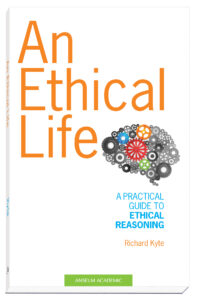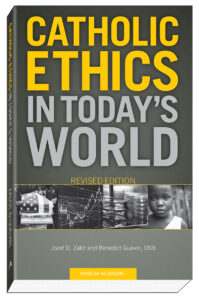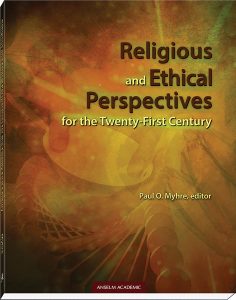Health Care Ethics, Revised Edition
Theological Foundations, Contemporary Issues, and Controversial Cases
About This Book
Overview
Introduces students to health care ethics through examination of real-life issues
In their thought-provoking and insightful revised introductory ethics text, authors Michael Panicola, David Belde, John Slosar, and Mark Repenshek address complex and controversial health care issues that are very much a part of our everyday lives. Using a normative framework, the authors incorporate specific issues, case studies, and multimedia aides in each chapter to encourage students to engage in moral discourse and reflection. The authors’ stimulating faith-based discussion of how particular circumstances in society have an impact on ethical decision making is a significant contribution to our understanding of the complex relationship between health care issues and ethics.
Linking new material, including chapters on the patient-physician relationship, regenerative medicine, the pharmaceutical/device industry, and health care reform, to classic chapters on reproductive technology, abortion and maternal-fetal care, stem cell research, genomic technologies, and end-of-life care, the authors underscore the important real-life concerns and issues that confront people in their daily living and the need to discern these concerns and issues with the goal of attaining human and social flourishing.
Key additions to the revised text include a glossary; updated facts, figures, tables, and statistics; new case studies; chapter discussion questions, including social-ethics questions; and social analysis.
Details
| Weight | 1.05 lbs |
|---|---|
| Dimensions | 5.375 × 1.5 × 8.25 in |
| Format | Softcover |
| Print ISBN | 978-1-59982-103-0 |
| Pages | 452 |
| Item # | 7034 |
|---|
Customer Reviews
“The new edition of the Healthcare Ethics book allows me to do less lecturing in science and public policy. The students told me at midterm that I should keep the book. They like how accessibly it is written, enjoy how the case studies make them think, and are learning without ‘feeling stupid.’”
“[This] introduction to health care ethics provides a solid basic text in the field and is particularly helpful in integrating a religious perspective into bioethics in a way that invites deeper dialogue. It is very readable, but does not sacrifice intellectual depth in being accessible.”
“I found this book to be excellent for my bioethics course. Among the features I appreciate is the authors’ robust introduction to the purpose and methods of ethics (the first four chapters) while keeping the material connected to medical ethics. The exercises in these chapters are effective for helping students appropriate the ideas. The authors write very accessibly. The presentation is grounded in Catholic moral thought and puts the best of the Catholic tradition forward while also airing criticisms subtly and constructively. The case studies are effective and the several charts and graphics work well.”
Sacred Heart University, Fairfield, CN
“This is the only bioethics book I’ve seen that is both suitable for undergraduates and that employs basic ethical terms (teleology, deontology, etc.) that mesh well with the understandings I use in lectures. There are LOTS of case studies and scenarios, offered in language that challenges undergraduates but not excessively. The cases are realistic, current, and well-described; students often can recognize similar medical situations from their lives or from the news. The book proceeds at an excellent pace for a course that covers medical ethics and moral theology. My students appreciate its language, tone, and detail. I will continue to use it!”
Department of Religious Studies and Theology
Canisius College
“Michael Panicola and his colleagues have given students a good foundation for ethical choices in health care. The book deepens and broadens the concept of ethics beyond laws and regulations. It presents a thoughtful and accessible explanation of major approaches to ethical thinking. And, before treating specific issues and methods, it provides the depth of discernment to the decision-making process.”
“I used the first edition of An Introduction to Health Care Ethics with undergraduates multiple times, and students loved the book. The second edition is updated with valuable new information and remains just as clear, careful, and compassionate. The focus on human dignity, human flourishing, and justice provides a normative basis. Principles and criteria for various issues help students to develop their own capacity for moral discernment. Each chapter stimulates discussion with intriguing cases. The book invites critical thinking by offering consideration of various perspectives. The new chapter on health care reform opens up important macro-issues, competing understandings of justice, and the need for reform. This excellent text is recommended for anyone who realizes that sooner or later they will need to be engaged in the serious and loving work of health care decision making.”
Table of Contents
Preface
- Understanding Ethics and How We
Approach Ethical DecisionsUnderstanding Ethics Generally
Understanding Health Care Ethics
How We Approach Ethical Decisions
Conclusion - The Bases for Our Decisions and the Role
of DiscernmentA Proposed Normative Basis
The Role of Discernment
Conclusion - Professionalism and the
Patient–Physician RelationshipWhat Does Professionalism Mean?
Aspects of Physician Professionalism
Conclusion - Abortion and Maternal-Fetal Care
Difficult Questions
Setting the Context: Clinical, Social, and Legal Considerations
Types of Abortion Procedures
The Social and Legal Status of Abortion in the United States
The Intersection of Law, Public Policy, Ethics, and Abortion
Discussion: Ethical Issues and Analysis
Conclusion - Care of Critically Ill Newborns
Fateful Decisions in the Neonatal Context
Setting the Context: The Evolution of Neonatal Medicine
Discussion: Ethical Issues and Analysis
Conclusion - Reproductive Technology and the Quest for Offspring
Ethics at the Intersection of Technology and Procreation
Setting the Context: The Science of Reproductive Technologies
Discussion: Ethical Issues and Analysis
Case Studies in Assisted Reproduction
Beyond Assisted Reproduction: Ethics and Prenatal Testing - Embryonic Stem Cell Research, Human Cloning, and Regenerative Medicine
What Cost a Cure?
Setting the Context: The Science and Politics of Stem Cell Research and Human Cloning
The Science of Human Cloning
U.S. Public Policy, Human Cloning, and Stem Cell Research
Discussion: Ethical Issues and Analysis
Conclusion - Current and Future Applications of Genomic Technologies
“Quest for Humanity’s Blueprint”: Ethical, Legal, and Social Implications
Setting the Context: The Science of Genes and Genomics
A Cautionary Tale: The Slippery Slope to Eugenics
Discussion: Ethical Issues and Analysis
Beyond Testing: Gene Therapy and Genetic Enhancement
Conclusion - Medical Research on Humans and the Pharmaceutical/Device Industry
Balancing Scientific Inquiry and Human Dignity
Setting the Context: Basic Concepts and Definitions in Research on Human Beings
Individual versus Social Good
Discussion: Ethical Issues and Analysis
Human Research: The Protocol
Conflict of Interests
Conclusion - Forgoing Treatment at the End of Life
An Ethically Complex Issue
Setting the Context: Framework for Decisions to Forego Treatment
Discussion: Ethical Issues and Analysis
Conclusion - Rethinking End-of-Life Care
Introduction
Setting the Context: Health Care at the End of Life
Discussion: Ethical Issues and Analysis
Conclusion - Health Care Reform
Health Care Reform and Human Well-Being
Setting the Context: Why Health Care Reform is Vital
Discussion: Ethical Issues and Analysis
Three Assumptions That Can Guide Health Care Reform
Conditions Creating the Need for Health Care Reform
Seeking Excellence in Health Care: New Rules for the Twenty-First Century Health System
Conclusion
Glossary
Index
Professional Reviews
”An excellent and comprehensive introductory volume on this topic, covering a variety of issues including professionalism in the patient-physician relationship, abortion, care of critically ill newborns, reproductive technology, embryonic stem cell research, genomic technologies, treatment at the end of life, and health care reform. There is a particularly useful introductory chapter about understanding ethics and approaches to ethical decisions. The authors provide a framework where ethics sits between being and doing, in other words who we ought to become as a person and how we ought to act in relation to others. This involves goals, virtues, principles and circumstances. Among the requirements for ethics are freedom and knowledge, reasoning and discernment, and a normative basis on which to judge the issues. This framework is then applied to health care ethics at three levels: macro health policy issues, middle organizational issues and micro clinical issues. Different types of ethical theories are also explained—virtue theories, deontological theories relating to action, and consequentialist theories. The discussions are very well illustrated with a variety of case histories.”










